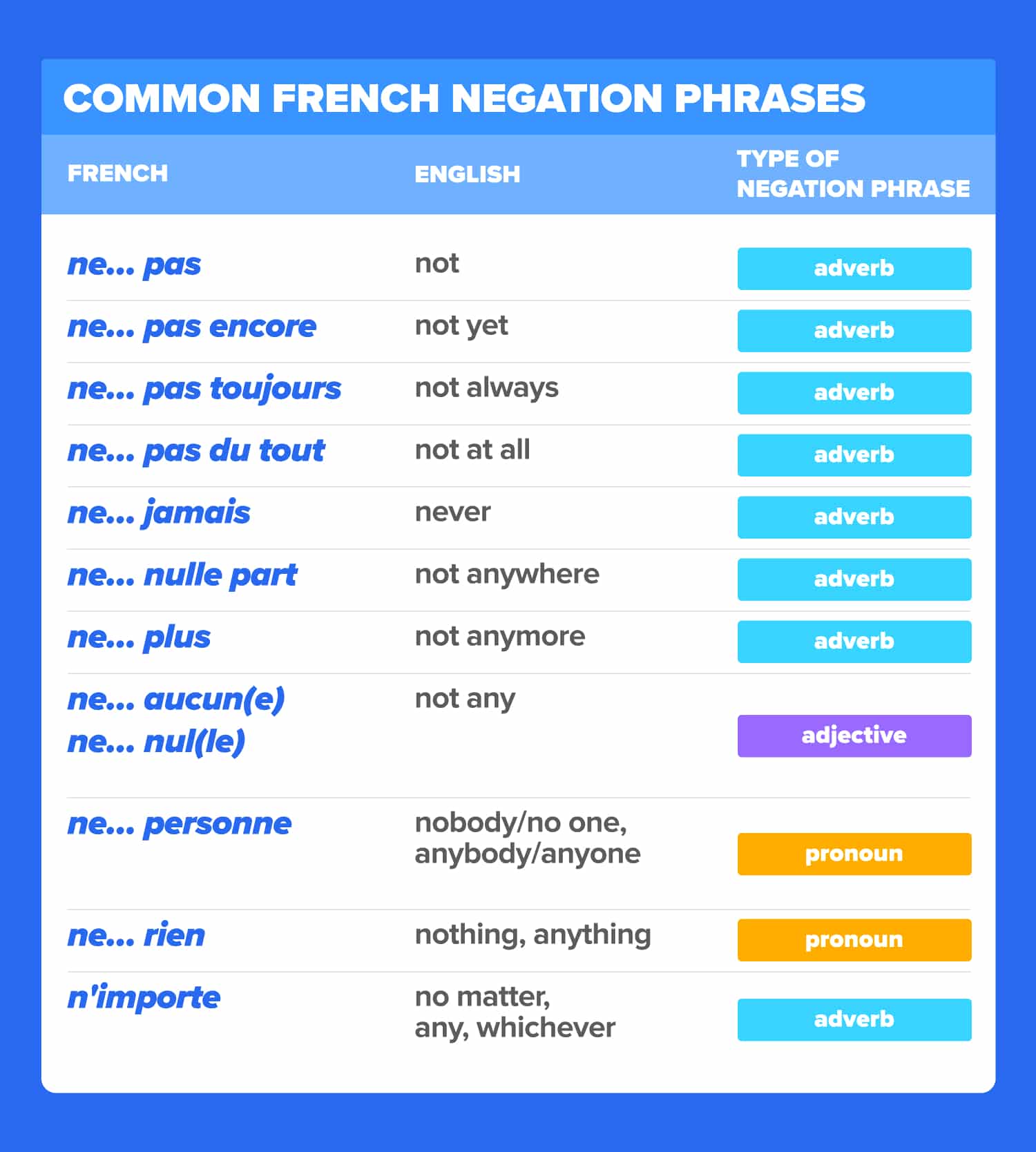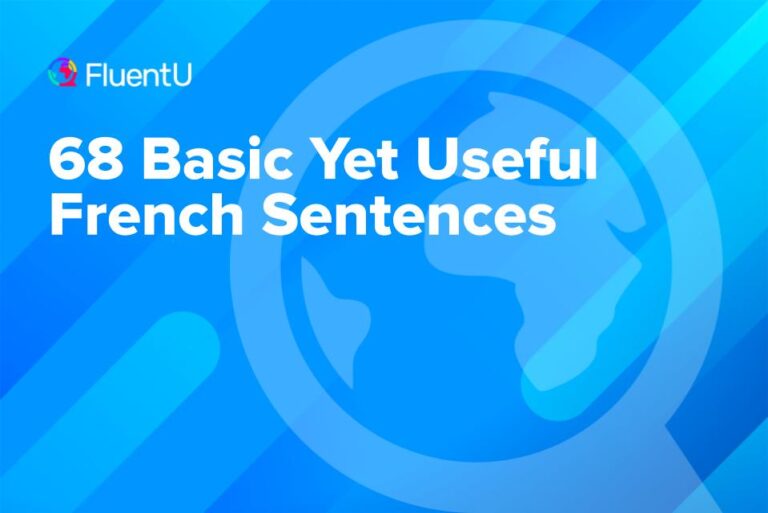French Negation: Your Guide to Negative Adverbs, Adjectives and More

So, you’ve learned how to conjugate in French and talk about things you’re doing, But how do you talk about things you’re not doing?
Knowing how to negate your sentences in French will help you communicate exactly what you mean (or don’t mean). You can clear up a lot with la négation (negation), so let’s start with the basics and build from there.
Download: This blog post is available as a convenient and portable PDF that you can take anywhere. Click here to get a copy. (Download)

Basic French Negation Using Ne… Pas
The simplest way to negate a sentence in French is to write ne or n’ before the main verb and pas after that verb. This typically applies in simple tenses (i.e., when there’s only one conjugated verb in the sentence).
Je ne parle pas espagnol. (I don’t speak Spanish.)
Il ne va pas à l’école demain. (He’s not going to school tomorrow.)
There are a few things to note when using the ne… pas negative construction.
| Ne... Pas Negation Rules | Examples |
|---|---|
| Shorten ne to n' if followed by a vowel | Elle n'est pas heureuse.
(She isn't happy.) |
| Can drop ne in speech | Je ne sais pas.
→ Je sais pas.
(I don’t know.) |
Change the article to de if followed by:
| J’ai des livres.
(I have some books.) → Je n’ai pas de livres. (I don’t have any books.) |
| Place ne and pas before an infinitive verb | Il est nécessaire de ne pas manger avant de faire du sport.
(It is necessary to not eat before doing sports.) Tu m’as dit de ne pas lire ce livre. (You told me not to read that book.) Ne pas ouvrir la fenêtre. (Don’t open the window.) |
| In the passé composé: ne + verbe auxiliaire + pas (or other word) + participe passé | Il n'a jamais visité Paris auparavant.
(He has never visited Paris before.) Nous n'avons pas regardé ce film. (We did not watch that movie.) Elles n'ont rien acheté au marché. (They did not buy anything at the market.) |
Common French Negation Phrases
Using Adverbs
While the ne… pas construction is technically a negative adverb, other adverbs can either be used in place of or alongside pas to negate the verb.
Check out these additional negative adverbs:
| French Negation (Adverbs) | Examples |
|---|---|
| ne... pas encore (not yet) | Je n'ai pas encore vu ce film.
(I have not yet seen that movie.) |
| ne... pas toujours (not always) | Il n'a pas toujours habité en France.
(He has not always lived in France.) |
| ne... pas du tout (not at all) | Elle n’aime pas du tout le café.
(She doesn’t like coffee at all.) |
| ne... jamais (never) | Nous n'avons jamais visité la Chine.
(We've never visited China.) |
| ne... nulle part (not anywhere) | Tu ne l'as trouvé nulle part.
(You didn't find it anywhere.) |
| ne... plus (not anymore) | Ils n'écrivent plus de lettres.
(They don't write letters anymore.) |
Using Adjectives
Like adverbs, adjectives can be used in place of pas in the negative construction.
This is different from using a negative adverb—the adjective must negate the following noun and therefore doesn’t follow the helper verb if there is one.
Note that both of the negative adjective phrases below must agree with the gender of the noun that follows.
| French Negation (Adjectives) | Examples |
|---|---|
| ne... aucun(e) (not any) Countable and uncountable nouns More common | Je n'ai aucun livre.
(I don't have any books.) Il n'a aucune confiance en elle. (He doesn't have any confidence in her.) |
| ne... nul(le) (not any) Uncountable nouns Less common, formal | Ils ne voient nul mal.
(They don't see any harm.) Nous n'avons trouvé nulle eau. (We haven't found any water.) |
Using Pronouns
Negative pronouns can be used in place of pas in a negative construction, but they are different because:
- They negate the pronoun that replaces the noun.
- When used after the verb, they can follow either the helper verb or the main verb in compound tenses.
- They can be moved to the beginning of the sentence.
Also, there are two main ways to construct French negation using pronouns: ne… personne and ne… rien.
| French Negation (Pronouns) | Examples |
|---|---|
| ne… personne (nobody/no one, anybody/any one) | Je n'ai vu personne.
(I didn't see anyone.) Personne n'est venu hier. (No one came yesterday.) |
| ne… rien (nothing, anything) | Non, je n'ai rien visité.
(No, I didn't visit anything.) Rien ne peut m'arrêter. (Nothing can stop me.) |
Using N’importe
Just one more negative construction, I promise!
The expression n’importe means “no matter,” “any” or “whichever” in French and can be followed by an interrogative adjective, adverb or pronoun.
Note that when the construction includes quel (which), the word must agree in gender with the following noun. Check out these examples below.
| French | English |
|---|---|
| Je veux n'importe quel livre. | I want any book. |
| Tu dois prendre n'importe quelle décision. | You have to make whichever decision. |
| Je peux visiter n'importe quand. | I can visit any time. |
| Fais-le n'importe comment. | Do it any which way. |
| Nous pouvons avoir notre rendez-vous n'importe où. | We can have our meeting anywhere. |
| N'importe qui peut le lire. | Anyone can read it. |
| Il écoute n'importe quoi. | He listens to anything. |
Other Expressions That Use Negation in French
Aside from what we’ve already talked about above, here are some other ways to express negation in French.
| French Expressions | Examples |
|---|---|
| Pas vraiment
(not really) | Il n'est pas vraiment intéressé par ce film.
(He's not really interested in this movie.) |
| Pas forcément
(not necessarily) | Ce n'est pas forcément difficile à comprendre.
(It's not necessarily difficult to understand.) |
| Pas mal
(not bad) | Ton dessin est pas mal du tout.
(Your drawing is not bad at all.) |
| Pas trop
(not too much) | Je n'aime pas trop les endroits bondés.
(I don't like places that are too crowded.) |
| Pas exactement
(not exactly) | Ce n'est pas exactement ce que j'avais en tête.
(It's not exactly what I had in mind.) |
| Pas complètement
(not completely) | Il n'est pas complètement satisfait de son travail.
(He's not completely satisfied with his job.) |
| Pas du tout d'accord
(not at all in agreement) | Je ne suis pas du tout d'accord avec cette proposition.
(I'm not at all in agreement with this proposal.) |
| Pas nécessairement
(not necessarily) | Le succès n'est pas nécessairement synonyme de bonheur.
(Success is not necessarily synonymous with happiness.) |
Practicing French Negation
To see all of these negation rules in action, and to experience all the many ways native speakers say “no” in French, try to immerse yourself in authentic content. Think podcasts, French movies and talk shows—basically anything that will let you listen to French speakers conversing naturally with one another.
For example, there’s the language learning program FluentU.
FluentU takes authentic videos—like music videos, movie trailers, news and inspiring talks—and turns them into personalized language learning lessons.
You can try FluentU for free for 2 weeks. Check out the website or download the iOS app or Android app.
P.S. Click here to take advantage of our current sale! (Expires at the end of this month.)
You can also head on over to Lingolia for a mix of exercises on all the negative constructions we’ve covered. Some will have you choose the correct word of negation between two options, while others will have you rewrite positive sentences as negatives.
After that, Tex’s French Grammar has some slick fill-in-the-blank exercises where you can check your answers.
Finally, ProProfs has more quizzes to keep you reviewing those negative constructions for days.
Just don’t quit, okay?
See what I did there?
Download: This blog post is available as a convenient and portable PDF that you can take anywhere. Click here to get a copy. (Download)
And one more thing...
If you like learning French vocabulary on your own time and from the comfort of your smart device, then I'd be remiss to not tell you about FluentU.
Other sites use scripted content. FluentU uses a natural approach that helps you ease into the French language and culture over time. You’ll learn French as it’s actually spoken by real people.
FluentU has a wide variety of great content, like interviews and web series, as you can see here:

FluentU brings native videos within reach with interactive subtitles.
You can tap on any word to look it up instantly. Every definition has examples that have been written to help you understand how the word is used.

For example, if you tap on the word "crois," you'll see this:

Practice and reinforce all the vocabulary you've learned in a given video with FluentU's adaptive quizzes. Swipe left or right to see more examples for the word you’re learning and play the mini-games found in the dynamic flashcards, like "fill in the blank."

As you study, FluentU tracks the vocabulary that you’re learning and uses this information to give you a 100% personalized experience.
It gives you extra practice with difficult words—and reminds you when it’s time to review what you’ve learned.
Start using the FluentU website on your computer or tablet or, better yet, download the FluentU app from the iTunes or Google Play store. Click here to take advantage of our current sale! (Expires at the end of this month.)









